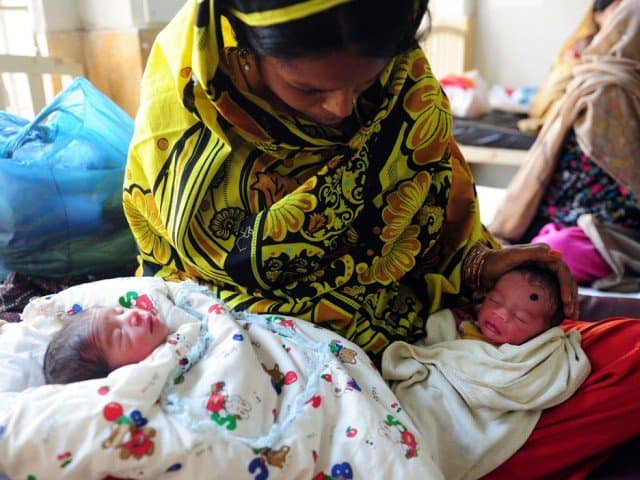Globally, the mortality rate of children under the age of five has dropped from 93 deaths per 1000 live births to 41 deaths in the last two decades, but in Pakistan, almost 81 out of 1000 children lose the battle of life before reaching the age of five, reveals the UNICEF’s latest report Levels and Trends in Child Mortality. Pakistani newborns’ dismal health condition and high mortality rate appallingly put the country among the list of most backward countries of the world.
Today, Pakistan’s political arena is overwhelmed with the discussion on the most recent Human Development Report of UNDP: the figures have been manipulated to exploit the findings to win the general elections to be held in 2018. However, no dialogue has been initiated on country’s horrendous mortality rate of neonatal, infant and children under the age of five.
The painfully high mortality rate of newborns in the country can be attributed to social conditions, financial restraints, lack of awareness and misplaced priorities of policymakers.
To overcome the major causes of infant deaths, the country solely depends on Lady Health Workers whose jobs are full of unfathomable hardships making their lives bitter every day. They have to bear diverse kind of hardships in the field and when it comes to their salary and service structure, our government isn’t willing to facilitate them.
Wide outreach of Lady Health Workers’ program has improved the scenario to some extent but the hazards are far stronger. Lack of efforts in providing ample finances, training, security and medical equipment impede these LHW’s progress, as a result, stagnant neonatal mortality rate adds to the misery of poor Pakistani children.
The sanitation woes
Water is the only fact all human lives hold in common to survive, but just how crucial it is to our daily lives is painfully evident in the predicament of developing countries. Simultaneously, the danger posed by the scarcity and polluted water is fatal for maternal and neonate’s lives. Tragically, in Pakistan, pregnant women have to travel many a mile in scorching heat to bring water at home, particularly the rural areas where more than 60 percent of country’s population survives. In interior Sindh, the water is often available at a far off place and that too is contaminated.
Unfortunately, this problem has penetrated the urban areas lately: Lahore, Peshawar, and Islamabad are affected by the dearth and polluted water and Karachi, the largest city of Pakistan, suffers from the scarcity of water. Add to the challenge the unwilling attitude of lawmakers and local body representatives who firmly believe act against the betterment of society. The Saaf Paani (clean water) project in Lahore is an example of lack of interest of our political elite in public issues.
The inadequate education
Educating mothers can help reduce the infant mortality rate for only smarter maternal decisions can have a meaningful impact on the excruciatingly high death rate of newborns. In this moderate and advanced world, often women are not considered worthy here hence spending finances on educating them is equivalent to wasting money for the most of the people. And if they succeed in getting the education, sex education or any subject related to maternity or pregnancy stands below the standards of our social morality. Unfortunately, these moral values lay within the middle and lower class predominantly.
To successfully reduce the mortality rate of newborns, it’s necessary to aware the masses to understand the risks and their prevention. It’s a fact that infant mortality rate depicts the health conditions and standard of living of a society. The most effective way is the provision of sufficient healthcare throughout the pregnancy. For prosperity, we must invest in the well-being of our mothers and babies.
Educated women tend to have a smaller family which reduces the risk of infant mortality and helps family lead a happy, healthy and prosperous life. These mothers are well aware of the health conditions and disease consequently better parental care, immunization, hygiene, and nutrition is possible.
Policymakers should devise an action plan for the provision of education which comprises of family planning, health issues of mothers, recognizing and tackling emergencies. Preconception and prenatal health care are fundamental to the health of mother and baby: unfortunately, very few mothers have the chance of regularly visiting the gynecologist. Only one concern always hunts the family that whether the forthcoming baby is a girl or boy.
The shoddy hospitals
All the doctors, nurses and patients are oftentimes not educated and trained properly consequently, whenever an emergency kicks in seldom an appropriate follow up is possible. The major reason for this delay or denial apart from unpreparedness of the staff is the unavailability of medical equipment plays a devastating role also.
Diagnostic issues in the land of pure cause innumerable tragedies. At first, most of the hospitals don’t have the facilities and doctors refer the patients to private diagnostic labs where not only they charged with huge amounts but the reports are also provided at least after one day. No one recognizes the emergency, and patient’s caretakers are not made aware of the critical condition either.
The scarcity of medical staff is a great hindrance for most of the developed countries’ neonatal units assign one nurse to two babies maximum but here we observe that one nurse has to look after more than eight infants.
The way forward
Inspiring change is possible by equipping women with tools and resources to become good mothers. These well-equipped and resourceful mothers will turn the tables, as they can be the most effective ambassadors creating a cycle to educate the rest.
The government and society need to realize the prevalent emergency and must act together at once. The women living in underprivileged areas are the most affected ones. A joint venture to reach out these mothers to share the information and provision of health care starting from pre-conception onward will only make our society healthy and strong. Experts opine that more than 80% of deaths can be prevented if trained midwives are available.
The risk of neonatal and infant mortality can be reduced by considering the following:
- Prevention of birth deficiencies
- Low weight at the time of birth
- Preconception care
- Prenatal care
- A healthy and clean environment for baby
- Regular checkups after the first comprehensive screening of the child














